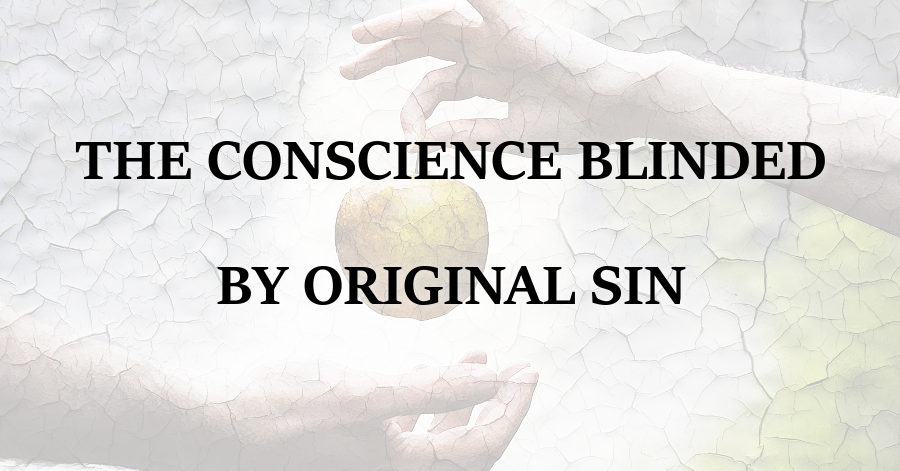 Anthony Burgess
Anthony BurgessTreatise on Original Sin
Part 3, chapter 2, sections 2-3.
SECT. II.
A Discovery of the Pollution of Every Man’s Conscience by Original Sin.The work next in order is to discover the pollution of every man’s conscience by original sin.
1. A Natural Blindness in the ConscienceFirst, there is naturally a blindness and a veil upon it, whereby it horribly misjudgeth, and so deserveth the prophet’s woe, “calling evil good, and good evil, light darkness, and darkness light.“
Take the conscience of a heathen not enlightened by God’s Word, and what darkness covereth the face of it? How enthralled to idols, as if they were a god that could either damn or save? Yea, the consciences of some heretics have had such Egyptian darkness upon them that they have thought they have served God by doing most abominable and unnatural things; insomuch that had not some of the Ancients, worthy of credit, delivered such things about them, we could never have believed that the conscience of a man could be so far blinded, as to think such things lawful, much less a worship of God.
The Gnostics taught that fornications and uncleanness were frequently to be exercised to avoid all conception, and if a child did follow, they would draw it from the womb, beat it in a mortar, season it with honey and pepper, and so eat it, saying, that in this manner they did celebrate the great Passover. The Carpocratians also affirmed, that everyone was bound to commit sin, and that the souls were put into the bodies till they did fulfill the measure of their iniquities, applying that in the parable to this purpose, “thou shalt not go out till thou hast paid the last farthing.” So, the Montanists made a sacrifice of the blood of a year old infant, which they pricked to death with needles in a most cruel manner. These also said that it was as great a sin to pull a leaf off the tree as to kill a man. The Donatists would throw themselves from steep mountains and drown themselves in water to make themselves martyrs. What horrid blindness was here upon their consciences? It is true indeed, these were not suddenly made thus abominable, therefore here was a voluntary contracted blindness upon their conscience, and a judicial one inflicted upon them, God giving them up to blindness. Yet had there not been such inbred error upon the conscience, such natural blindness upon it, it could never be improved to such height of impiety!
Oh, then groan under this blindness that is naturally upon thy conscience! That which should be the pilot to guide the ship of thy soul and body to an eternal haven, but knoweth no compass, beholdeth no star, and being practically blinded carrieth thee to Hell, while thou art thinking thou art sailing to heaven. That which should be the rule to thy actions is all over crooked and perverted. Thus every man’s conscience is naturally in the dark, and maketh us fall into every ditch, because the blind leadeth us. While the foundation is thus destroyed, there is no hope either of conversion or salvation. Thou that wallowest in thy sins, thou that art upon the brinks of Hell, and yet rejoicest and makest thyself blessed: Oh that thy conscience were enlightened! Oh, that the Lord’s candle within thee did give any light! What a terror and an amazement wouldst thou be to thyself? Thou art no better than a brute till this conscience in thee is able to inform and direct thee.
2. The Conscience is Numb and Asleep.Secondly, conscience is naturally polluted, not only by the blindness, but also by the senselessness and stupidity that is upon it. This is the evil polluted conscience, lying in every man’s breast fast asleep. Though one sin be committed after another, though lusts as so many thieves come to steal thy soul away, yet this dog doth not so much as give one bark. Doth not experience abundantly confirm this? See you not most men going on in all evil and wickedness, so that you would think they dare neither eat nor drink nor sleep, lest so many devils should come and carry them quick to Hell? Yet they have a stupefied conscience, it never giveth them one blow, or a check for it. How cometh this serpent in thy breast to be thus benumbed that it doth not give one hiss?
The expression you heard of an evil conscience was a “seared” one, that is (as some expound it) a senseless hardened one, like any part of the body that by burning is made insensible. Others say that as a putrefied part of the member of the body by incision is cut off, so it’s a conscience cut off from a man, that he hath none. Others allude that as brands and marks of infamy are made by hot irons upon the shoulders and faces of stagitious [wicked] persons, thus, it’s a conscience that is branded and noted by all, whereby he is made infamous and a reproach where he liveth. All these explications may well be taken in, and although the Apostle speaketh there of some enormous wicked men, more vile than ordinary, yet as Paul doth apply to all men by nature what the Psalmist had spoken of some notorious and most ungodly enemies of the Church (Romans 3), because the seed and root of these is in all, so we may appropriate this seared conscience to every man naturally, whereby a man commits gross and foul sins, and yet finds not one prick or stab at his heart for it.
What made David, when he had numbered the people to have his heart smite him presently, but because his conscience was sanctified and made tender by God (1 Chron. 21:8,13)? Whereas thou canst a thousand times fall into the same gross sins, and thy conscience giveth thee not one lash for it? Is not this because thy conscience is stupefied? It hath made thee in all thy sins as Lot was, when made drunk by his daughters, and knew not in the morning what he had done. Thus, with the same stupidity and sottishness dost thou act sin, it cometh from thee, as excrements from a dying person, and thou hast no apprehension of them: as in sleep the stomach doth digest that meat, which if waking would so molest it, that there would be no ease, till exonerated: Thus, while conscience is asleep, those things are committed, which if it were tender, it would with fear and trembling fly from. O men bitterly to be lamented and mourned over! Conscience which is set as a schoolmaster to direct and reprove thee is become a flatterer, or rather lieth stark dead within thee, that the Devil and sin, in all the lusts thereof, may hurry thee whether they please, and conscience doth not contradict. You may as well offer light to the blind, speech to the deaf, wisdom to the brute beast, as publish the great truths and commands of God to them while conscience is thus stupefied within them. Therefore, in conversion the first work of grace is to make this tender and sensible, even of the least sin.
SECT. III.
The Blindness and Stupidity of Conscience Discovered in the Several Offices and Actions of it.Thirdly, because this pollution of the conscience is expressed generally as blindness and stupidity, let us examine how this sinfulness is seen in the several offices and actions of conscience, for which God hath placed it in the soul.
1. In its Practical Application of General Truths.One main work of conscience is to apply particularly what we read in the Scripture as generally spoken. When it readeth the threats and curses of the law to such sins as thou art guilty of, then conscience is to say, “this belongeth to me, this curse, this burden, is my curse it’s my burden.” Because David did not let his conscience do its duty in application, David could condemn sin in general, his wrath was kindled against such sinners as himself in the general, so Nathan was forced to be his conscience to him, saying, “Thou art the man” (2 Sam. 12:7). Thus conscience, if not polluted, when it heareth any woe denounced against such and such sins, stands up and saith, “Thou art the man.” Hence God giveth the commands by particular application, “Thou shalt not commit adultery,” “Thou shalt not steal,” that conscience may say, “This Commandment belongs to me.” As natural bodies they act by a corporal contact, so the Scripture worketh upon the soul by a spiritual contact, and that is the application of conscience. Insomuch that if we do a thousand times read over the Scriptures, if we hear sermons upon sermons all our life, if conscience doth not apply, all becomes ineffectual.
Why We Knowingly Commit Sin.And this may answer that question: How it cometh to pass that a man can commit those sins which he knoweth to be sins, which his conscience tells him are sins? Who are there so much stupefied and besotted by sin, that do not in the general know that the ways they live in are wicked, that they provoke God, that they ought not to do so? How then is it possible, that they should close with those sins that they know to be so, seeing the will cannot will evil, as it is evil?
Now the answer is: This ariseth from the defect of conscience, she doth not particularly make such a powerful application pro hic & nunc [for here and now], as it ought to do. There is therefore a general knowledge, an habitual knowledge of such things to be sins; yea it may be a particular apprehension, that they are now sinning and offending God; but this is only a speculative apprehension, it’s not a practical one produced by conscience in thee. Oh therefore that all our auditors were delivered from this original pollution of conscience, for therefore we preach in vain, and you hear in vain, because no application is made to your own hearts! None brings the truth, the command, the threatening to his own soul, saying, “This is my portion, none so guilty as I am in this particular,” and thus (as she said to the prophet) “Thou hast brought my sins to my mind.” Or as the woman of Samaria concerning Christ, he had told her of all that she had done (John 4:29). Thus saith the applying conscience, “This Sermon brings my sins to my mind, This Sermon tells me of the wickedness at such a time committed by me.” It was the prophet’s complaint of his hearers that none said, “What have I done?” (Jer. 8:6). They did not apply it. Therefore, till the grace of God quicken the conscience, making thee to cry out, “what shall I do, I have sinned?” God’s Word hath found me out; It is me the Law condemneth; It is me that the curses belong to, as if I were mentioned and named, as if I had heard a voice from Heaven, saying, “Thou Thomas, Thou John, here is thy sin, here is thy doom.” I say, until this be done, all thy knowledge in general and all the texts of Scripture in thy memory have no influence at all.
2. In its Weakness over the Affections and the Will.Secondly, Herein is the corruption of the conscience naturally seen, That though it doth apply, yet it is in so weak and cold a manner, that it hath lost its activity and predominance over the affections and the will of a man: insomuch that though conscience do speak, do rebuke, do apply, yet a man careth not for it. The affections and the will are not kept in awe by it. Thus, although conscience in many doth not so much as stir, it is stark dead, yet in many it doth sometimes apply, bringing home the Word of God to the heart, so that he cannot but confess if he doth thus and thus he sinneth. But the conscience is too weak. Affections and passions, like Amnon to Tamar, are too strong and consuperate her, whether she will or no.
Is not this the dreadful condition of many, who frequent our congregations, whose consciences condemn them daily? “Thou art such a sinner, thy ways are damnable,” but they slight and despise these applications of conscience, as rude scholars the authority of their master. What care they for the monitor in their breast? Like Balaam they will press forward to their wickedness, though conscience stand like an Angel with a sword in his hand to stop in the way. The Apostle speaketh excellently to this purpose, “They detain the truth in unrighteousness” (Rom. 1:18), they keep conscience a prisoner, gladly would it do its duty, but they imprison and shackle it. Now this weakness is come upon conscience by original sin, otherwise Samson like, nothing could bind it, but it would command the will and affections, yea the whole man to obey it. Oh the pitiful estate then of such men who are sinners against conscience, profane against conscience, whose lusts are stronger than their conscience! As it is with some poor prisoners, they go up and down with their keeper. Thus, these men go from place to place to commit their sins, and conscience as their keeper followeth them up and down, only they despise and contemn the dictates of it, which will be woeful in the later end.
3. In its Inconsistency and Infrequency.Thirdly, though conscience may apply weakly and faintly, so also seldom, and not constantly, nor daily. The cock crew once or twice before Peter remembered himself. Conscience may apply once or twice, yet the noise of lusts drowns the voice of it. Therefore unless it speak frequently, unless it be applying often, as the prophet did three times to the dead child, there will not be any spiritual life procured. Thus, you have the consciences even of natural men in some fits, under the expectation of some great and eminent judgements. They find the power of conscience upon them, as Pharaoh, Ahab, and Felix, who trembled under Paul’s preaching, but then this is only a flash; it’s like a sudden clap of thunder that terrifieth for the present, but when past is presently forgotten. Thus, in fears of death, under some powerful sermon, thy conscience giveth a blow, a sharp prick into thy heart, for a while thou art in some agony, in some terror, but because conscience doth it not often, never giving thee over till it hath recovered thee, hence it is that thou returnest to thy old stupidity again.
4. In its Neglect of Witnessing Against Secret Sins.Fourthly, as conscience naturally doth not its duty in applying, so neither in witnessing, in bearing testimony to our actions, which yet is one great end why conscience is put into a man. It is ordinarily said conscientia est mille testes, conscience is a thousand witnesses, and so indeed when it doth bear testimony to a man’s action, it’s more than a thousand, it’s more than all the world; yea, it is not only mille testes, but mille tortores, a thousand tormentors. But alas! It’s so defiled, that in many things, if not in all things, it faileth and giveth (at least) no true witness at all. For if there were not this pollution upon it, with what a loud voice would it cry to thee, saying, I know, and God knoweth, what are the sins that thou daily livest in? What little regard this witness hath, appeareth in that if men can accomplish their impieties and there be no witnesses to confirm it before men, they matter not at all, for the witness of conscience and God can bear against them. Oh, this vileness of thy heart, that thou runnest from the eyes of men, but not considerest the eyes of God, and of thy own conscience that behold thee! Though indeed thy conscience is for the most part mute and speechless, lets thee alone, do what thou wilt, it will not witness against thee, but is bribed rather, and speaks for thee, and flattereth thee. Bewail then the sinfulness upon conscience even in this, that it doth not bear witness to thy evil actions, or when it doth, it is so coldly, and languidly, that thou canst hardly hear the voice of it.
As the prophet (which is like an external conscience in the Church) is to lift up his voice like a trumpet (Isa. 58:1), to inform of transgressions, and not to spare: Thus it should be with conscience in thee. And as there is a woe to that people whose pastor is a dumb dog, no less is it to those whose conscience also is a dumb dog. So that though the witnesses and testimonies of conscience against thyself and actions be troublesome and vexatious, thou canst not eat, or drink, or sleep for them, yet this is more hopeful, and may be more preparatory to conversion, than when thy conscience will say nothing, or is corruptly bribed, saying to thee in all thy actions, as Absalom did to everyone that came to him that his cause was good.
But above all, these cold and soft whisperings of conscience, as if it were afraid of thee more than thou of it, are notoriously discovered in the actions of secret sin. For if thy iniquities be committed secretly, though thou livest in secret uncleanness, in secret thieving and cozening in thy dealings so that the world doth not know it, thou thinkest all is well with thee: How could this be, if conscience did roundly bear witness to these secret sins? This would as much shame, affect, and torment thee, as if all the world did know what thou hast done in private. Oh, but this conscience is muzzled! Or as was said of Demosthenes, when he would not plead for a client, but pretended a quinsy in his throat, he did Argentanginam pati; Thus thy conscience hath swallowed a camel into its throat, and so spareth thee, and lets it alone. Otherwise if conscience did his office, thou who livest in secret sins wouldst be more molested and disquieted by its continual testimonies against thee than if all the congregation had been spectators of thy private wickedness.
Therefore the pollution of the conscience by original sin, is fully proclaimed by all the hidden works of dishonesty, by all the close, secret sins committed in the world. For were conscience ready to testify, it would follow thee as close as the shadow to the body, as Asahel did Joab. Oh then let such clandestine sinners be afraid! For though conscience be now stupefied, yet this will one day be the gnawing worm in thee that will never die.
Advertisements Share this:





